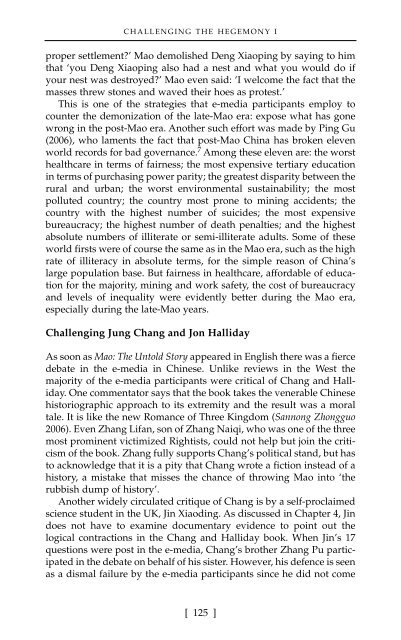Battle for China's Past : Mao and the Cultural Revolution
Battle for China's Past : Mao and the Cultural Revolution
Battle for China's Past : Mao and the Cultural Revolution
Create successful ePaper yourself
Turn your PDF publications into a flip-book with our unique Google optimized e-Paper software.
CHALLENGING THE HEGEMONY I<br />
proper settlement?’ <strong>Mao</strong> demolished Deng Xiaoping by saying to him<br />
that ‘you Deng Xiaoping also had a nest <strong>and</strong> what you would do if<br />
your nest was destroyed?’ <strong>Mao</strong> even said: ‘I welcome <strong>the</strong> fact that <strong>the</strong><br />
masses threw stones <strong>and</strong> waved <strong>the</strong>ir hoes as protest.’<br />
This is one of <strong>the</strong> strategies that e-media participants employ to<br />
counter <strong>the</strong> demonization of <strong>the</strong> late-<strong>Mao</strong> era: expose what has gone<br />
wrong in <strong>the</strong> post-<strong>Mao</strong> era. Ano<strong>the</strong>r such ef<strong>for</strong>t was made by Ping Gu<br />
(2006), who laments <strong>the</strong> fact that post-<strong>Mao</strong> China has broken eleven<br />
world records <strong>for</strong> bad governance. 7 Among <strong>the</strong>se eleven are: <strong>the</strong> worst<br />
healthcare in terms of fairness; <strong>the</strong> most expensive tertiary education<br />
in terms of purchasing power parity; <strong>the</strong> greatest disparity between <strong>the</strong><br />
rural <strong>and</strong> urban; <strong>the</strong> worst environmental sustainability; <strong>the</strong> most<br />
polluted country; <strong>the</strong> country most prone to mining accidents; <strong>the</strong><br />
country with <strong>the</strong> highest number of suicides; <strong>the</strong> most expensive<br />
bureaucracy; <strong>the</strong> highest number of death penalties; <strong>and</strong> <strong>the</strong> highest<br />
absolute numbers of illiterate or semi-illiterate adults. Some of <strong>the</strong>se<br />
world firsts were of course <strong>the</strong> same as in <strong>the</strong> <strong>Mao</strong> era, such as <strong>the</strong> high<br />
rate of illiteracy in absolute terms, <strong>for</strong> <strong>the</strong> simple reason of China’s<br />
large population base. But fairness in healthcare, af<strong>for</strong>dable of education<br />
<strong>for</strong> <strong>the</strong> majority, mining <strong>and</strong> work safety, <strong>the</strong> cost of bureaucracy<br />
<strong>and</strong> levels of inequality were evidently better during <strong>the</strong> <strong>Mao</strong> era,<br />
especially during <strong>the</strong> late-<strong>Mao</strong> years.<br />
Challenging Jung Chang <strong>and</strong> Jon Halliday<br />
As soon as <strong>Mao</strong>: The Untold Story appeared in English <strong>the</strong>re was a fierce<br />
debate in <strong>the</strong> e-media in Chinese. Unlike reviews in <strong>the</strong> West <strong>the</strong><br />
majority of <strong>the</strong> e-media participants were critical of Chang <strong>and</strong> Halliday.<br />
One commentator says that <strong>the</strong> book takes <strong>the</strong> venerable Chinese<br />
historiographic approach to its extremity <strong>and</strong> <strong>the</strong> result was a moral<br />
tale. It is like <strong>the</strong> new Romance of Three Kingdom (Sannong Zhongguo<br />
2006). Even Zhang Lifan, son of Zhang Naiqi, who was one of <strong>the</strong> three<br />
most prominent victimized Rightists, could not help but join <strong>the</strong> criticism<br />
of <strong>the</strong> book. Zhang fully supports Chang’s political st<strong>and</strong>, but has<br />
to acknowledge that it is a pity that Chang wrote a fiction instead of a<br />
history, a mistake that misses <strong>the</strong> chance of throwing <strong>Mao</strong> into ‘<strong>the</strong><br />
rubbish dump of history’.<br />
Ano<strong>the</strong>r widely circulated critique of Chang is by a self-proclaimed<br />
science student in <strong>the</strong> UK, Jin Xiaoding. As discussed in Chapter 4, Jin<br />
does not have to examine documentary evidence to point out <strong>the</strong><br />
logical contractions in <strong>the</strong> Chang <strong>and</strong> Halliday book. When Jin’s 17<br />
questions were post in <strong>the</strong> e-media, Chang’s bro<strong>the</strong>r Zhang Pu participated<br />
in <strong>the</strong> debate on behalf of his sister. However, his defence is seen<br />
as a dismal failure by <strong>the</strong> e-media participants since he did not come<br />
[ 125 ]
















